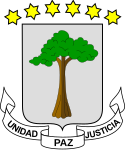
Teodoro Obiang Nguema Mbasogo is an Equatoguinean politician, and former military officer who has served as the second president of Equatorial Guinea since 3 August 1979. He is the longest-serving president of any country ever and the second-longest consecutively-serving current non-royal national leader in the world.
Cándido Muatetema Rivas was a political figure in Equatorial Guinea who was Prime Minister from 2001 to 2004.

The Democratic Party of Equatorial Guinea is the ruling political party in Equatorial Guinea. It was established by President Teodoro Obiang Nguema Mbasogo on 11 October 1987.

Convergence for Social Democracy is the opposition party in Equatorial Guinea. It was the only opposition party with parliamentary representation during 2013-2017.

Equatorial Guinea elects on the national level a head of state – the president – and a legislature. The president is elected for a seven-year term by the people. President Teodoro Obiang Nguema Mbasogo was re-elected unopposed on 15 December 2002. The Chamber of People's Representatives has 100 members, elected for a five-year term by proportional representation in multi-member constituencies.

Early parliamentary elections were held in Equatorial Guinea on 4 May 2008, alongside local elections; 100 seats in parliament and 230 council seats were up for election. The ruling Democratic Party of Equatorial Guinea won 89 seats in parliament.

Presidential elections were held in Equatorial Guinea on November 29, 2009. Teodoro Obiang Nguema, who has been President since 1979, ran for another term and won re-election with 95.8% of the vote, according to official results. Opposition leader Plácido Micó Abogo placed second with 3.6%. However, international observers and the main opposition candidate questioned the legitimacy of this election, noting the poor management which created an unfriendly field for other candidates to take part, media manipulation and the unbalanced results.

Ignacio Milam Tang is an Equatoguinean politician who was Prime Minister of Equatorial Guinea from July 2008 to May 2012. He is a member of the Democratic Party of Equatorial Guinea (PDGE). From May 2012 to June 2016, he was First Vice President of Equatorial Guinea, serving alongside President Obiang's son, Teodorín.
Plácido Micó Abogo is an Equatoguinean politician. He has been the Secretary-General of the Convergence for Social Democracy (CPDS), an opposition political party in Equatorial Guinea, since 1994.

Parliamentary elections were held in Equatorial Guinea on 7 March 1999. They were won by the Democratic Party of Equatorial Guinea of President Teodoro Obiang Nguema Mbasogo, which took 75 of the 80 seats in the Chamber of People's Representatives.

Parliamentary elections were held in Equatorial Guinea on 28 August 1983, the first since 1973. The new constitution approved in a referendum the previous year provided for a 41-seat Chamber of People's Representatives. President Teodoro Obiang Nguema Mbasogo selected a single candidate for each constituency, which were then approved by voters. No political parties took part in the election, with all candidates standing as independents.

Parliamentary elections were held in Equatorial Guinea on 21 November 1993. They were the first multi-party elections in the country since the pre-independence elections of 1968. Although seven parties were allowed to run in the election, the ruling Democratic Party of Equatorial Guinea (PDGE) maintained its grip on power, winning 68 of the 80 seats in the enlarged Chamber of People's Representatives. According to official figures, voter turnout was 67%. The Joint Opposition Platform, an alliance of eight opposition parties, called for a boycott and claimed voter turnout was as low as 20%.

Parliamentary elections were held in Equatorial Guinea on 26 May 2013, alongside local elections. Following constitutional reforms approved in a 2011 referendum, they were the first elections in which the newly established Senate is elected. The ruling Democratic Party of Equatorial Guinea won all but one seat in both houses of Parliament.

Parliamentary elections were held in Equatorial Guinea on 12 November 2017. The ruling Democratic Party of Equatorial Guinea won all but one of the seats in the Chamber of Deputies, every seat in the Senate and control of every local council.
Ángel Masié Ntutumu was an Equatorial Guinean politician.

Parliamentary elections were held in Equatorial Guinea on 16 December 1973. The new constitution approved in a referendum the same year provided for a 60-seat People's National Assembly. The United National Workers' Party (PUNT) was the sole legal party at the time, as the 1973 constitution had made the country a one-party state. The PUNT presented a single list of 60 candidates for the 60 seats, which was approved by voters.

General elections were held in Equatorial Guinea on 20 November 2022 to elect the President and members of Parliament, alongside local elections. Originally the parliamentary elections had been scheduled for November 2022 and presidential elections for 2023. However, in September 2022 Parliament approved a proposal to merge the elections due to economic constraints.
Salvador Ondo Nkumu is an Equatoguinean politician and former judge who has served as the country's Minister of Justice since 2018. He had previously served as Minister of Justice from 2008 to 2011.






